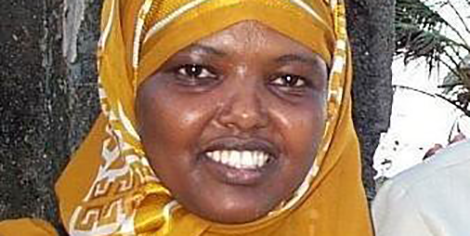
This article was originally published by ETH News on 8 March 2019.
Many small, local steps may lead more sustainably to peace than big dreams of the perfect state. This principle lies at the heart of an innovative approach to conflict mediation developed by a Kenyan mediator and an ETH researcher.
They called her Dadahad, “a person standing in the middle” or “a person to whom both sides have access”. Dekha Ibrahim Abdi was a teacher and school director in Wajir, a region in north-eastern Kenya bordering Somalia and Ethiopia. Her commitment to conflict resolution and peace building transformed the people and communities she worked with.
Dekha lived in a nomadic society in an Islamic religion. In her region, conflicts regularly arose when resources and access to land and water become scarce in the dry season or when elections took place and political power was redistributed. In this context, the lines of conflict generally run along traditional ethno-political clan and kinship structures and often cross national borders, artificial legacies from colonial times.
Dekha Ibrahim Abdi was a mediator. A mediator bridges communication between the conflict parties and facilitates mutual understanding between them through dialogue and discussion. She witnesses the discussion and paves the way for the parties to settle their dispute themselves. “Whatever the outcome of a mediation, it is in every case owned by the people involved. After all, it is not the mediator who suggests the solution, nor does she act as an arbitrator,” says Simon J. A. Mason, head of the Mediation Support Team at the Center for Security Studies at ETH Zurich.
Peace in the most basic sense of safety
When asked what motivated her about mediation, Dekha used to reply: “My mother and I were born into a violent, instable society. I wanted peace in the most basic sense of safety. I wanted my child to be able to count on civilian law to protect her.” In 2007, Dekha Ibrahim Abdi received the Right Livelihood Award, also known as the Alternative Nobel Prize, for her contribution to the resolution of violent conflicts through cooperative processes. She died in 2011 from injuries sustained in an automobile accident.
Simon Mason has worked with Dekha Ibrahim Abdi for many years. The new book “Mediation and Governance in Fragile Contexts: Small Steps to Peace” is a result of this collaboration and six days of interviews with Dekha. Together, Mason and Dekha developed an innovative approach to reflect on, and guide, peace mediation in situations where people experience violent conflict, and where they perceive the forms of state or non-state governance as being insecure and severely inadequate.
Sustainable solutions instead of hasty perfection
Because many of the mediation approaches developed in secure and stable states in North America and Europe cannot be transferred one-to-one to fragile contexts, their approach specifically combines the local, gender-, culture- and conflict-specific internal perspective with the academic, external perspective rooted in worldwide comparative methodologies.
As the name “Short-, Medium-, and Long-Term Linkages (SMALL) Framework for Peace” already says, their approach is characterised by the fact that they distinguish which measures are to be taken in the short, medium and long term in order to create stable governance and sustainable peace. Mediation is the short-term measure to resolve an acute conflict through a negotiated agreement.
However, in order to contribute to stable, long-term governance, medium-term measures such as the establishment of “local peace committees” are crucial. In these committees, the conflict parties regularly exchange views and ideas for action and policy reform, and can quickly put together mediation teams. Representatives of both the traditional and modern governance systems are involved.
“Many small steps that are locally rooted and linked to medium and long-term initiatives to build a reliable state lead more sustainably to peace and good governance than rushing to the ultimate goal of a ‘perfect’ state,” concludes Mason.
Reference
Dekha Ibrahim Abdi, Simon J. A. Mason. Mediation and Governance in Fragile Contexts: Small Steps to Peace. Lynne Rienner Publishers, 2019.
More information on the book and audio clips of Dekha Ibrahim Abdi are also available at: www.mediation-governance.ethz.ch.
About the Author
Florian Meyer is an editor and communication specialist for the Corporate Communications’ content team at ETH Zurich.
For more information on issues and events that shape our world, please visit the CSS website.

